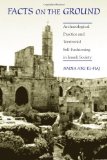Biblical stories are uncorroborated
Gabriel Piterburg on Facts on the Ground By Nadia Abu El-Haj
"...she has been vindicated by Israeli archaeologists themselves. A group of Israeli archaeologists that had been sent after the 1967 war by the state to dig the West Bank, where most of the biblical stories are supposed to have occurred, said, because they are honest archaeologists, "what we have found is that the biblical stories have no corroborating evidence outside the biblical text itself". This is the same argument that Nadia Abu El-Haj makes. The findings of these archaeologists triggered a big debate in Israel in the late 1990s and early 2000s."

Q: Can you tell us about the controversy Facts on the Ground sparked when it was published?
A: Nadia Abu El-Haj is a Palestinian American, but from a younger generation than Edward Said. She did her doctorate in anthropology at the University of Chicago and published this book in 2001. It's important to tell the story of the controversy surrounding it because it really shows the lunacy of US politics and culture, especially when it comes to talking about Israel/Palestine. The book was picked up by an alumna of Barnard College in New York where Abu El-Haj teaches and was at the time a candidate for tenure. This alumna was an American Jewish settler in the Occupied [Palestinian] Territories. She started a campaign to deny Abu El-Haj tenure on the grounds that this was an anti-Semitic book, that she was an incompetent scholar who could not read Hebrew, and who falsified the topic she was studying. She basically wanted to see her fired. This thuggish attack engendered a wave of support for Nadia Abu El-Haj. Barnard College eventually dismissed the criticisms of her and she was given tenure.
Q: What can you tell us about the book?
A: The book itself is a study of the archaeology of Palestine as it was developed by the Israeli state as a continuation of the 19th century Christian tradition of unearthing the Bible and of finding archaeological remains in order to prove the historical veracity of the Old Testament and therefore the claim of the Jews over the Holy Land. In a way this is part of the myth of the return to the land of Israel, in which the Jews are not immigrating to Palestine and dispossessing the indigenous people, but are in fact returning and reclaiming what had been originally theirs, by divine right and archaeological proof.
What she did was to study the science of archaeology from the perspective of what one could call the criticism of knowledge – to show how knowledge is part of power, politics, of ideology of political purposes and specifically to show how this was part of the Zionist claim over Palestine and the emptying of this land – not only physically but also discursively and scientifically – of the Palestinians' presence. The author undertook a long period of research in Israel/Palestine, which was preceded by a very thorough study of Hebrew. She did extensive research in Israeli archives and journals and carried out interviews. What she was able to do was a very thorough empirical, documented study of Israeli archaeology and how it was part of ideologically and politically claiming the land and, as a consequence, disinheriting the Palestinians.
Q: Given that she is an anthropologist not an archaeologist, is she really qualified to take such a stand? It's surely unfair to criticise all Israeli archaeologists for being ideologically motivated?
A: I think this is sheer nonsense. The implication of this would be that you cannot criticise a field of knowledge unless you're a practitioner of it. It's like saying you can't be a critic of colonialism unless you are a colonial officer, because otherwise you don't really know the craft. Or you can't, as a lawyer, sue for medical malpractice because you're not a doctor. Historians study medieval guilds without being craftsmen and peasants and without having done a single day of agricultural work. EP Thompson wrote magnificently on working-class consciousness – last I hear, he wasn't exactly a member of the British working class.
I think she has been vindicated by Israeli archaeologists themselves. A group of Israeli archaeologists that had been sent after the 1967 war by the state to dig the West Bank, where most of the biblical stories are supposed to have occurred, said, because they are honest archaeologists, "what we have found is that the biblical stories have no corroborating evidence outside the biblical text itself". This is the same argument that Nadia Abu El-Haj makes. The findings of these archaeologists triggered a big debate in Israel in the late 1990s and early 2000s.
Original piece in The Browser
